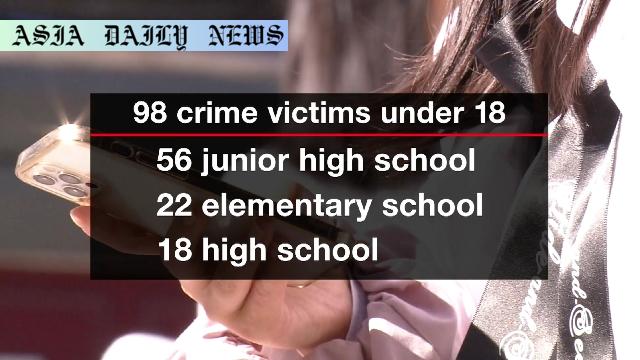Online Gaming: Japanese police report risks for children becoming victims of crimes through anonymous chats and gaming connections.
Online gaming has contributed to 98 minor-related crimes in 2024 in Japan.
Children, especially junior high schoolers, are vulnerable to online predators.
Police recommend activating parental controls for safer online interactions.
Encouragement from online acquaintances can lead to exploitation, including dangerous activities like fraud jobs.

The Alarming Rise in Victimized Children Through Online Gaming
Recent reports released by Japan’s National Police Agency reveal a concerning trend where online gaming platforms have become a gateway for crimes targeting children. According to the 2024 data, 1,486 minors were identified as crime victims as a result of their engagement on social media platforms, of which 98 cases—an increase of 9 from the previous year—were directly tied to connections made through online games. These findings are indicative of the growing dangers lurking within the digital gaming world, where anonymity can foster hazardous interactions.
The age distribution of these 98 victims is particularly troubling. Over half of them, totaling 56 victims, were junior high school students. Meanwhile, 22 victims were elementary school children, and 18 were high school students. This highlights the vulnerability of younger individuals who are often ill-equipped to detect and defend against online exploitation. The anonymity provided by gaming platforms, combined with the permissiveness of in-game communication tools such as voice chats and text messages, has made it easier for malicious individuals to prey on unsuspecting children.
Understanding the Exploitation Pattern in Online Gaming
Online gaming is not just a pastime for children but an immersive experience where they form connections and bonds with other players. However, these connections can sometimes be deceptive, with predators taking advantage of children’s admiration for skilled gamers or their desire for companionship. Such offenders skillfully exploit these genuine emotions, often gaining trust before luring their victims into sharing personal information or falling into more sinister traps.
A case that epitomizes this alarming trend is that of a 17-year-old high school student who was coaxed by a gaming acquaintance into traveling abroad for what seemed like an attractive job offer. However, this job was connected to a telephone fraud group in Myanmar, forcing the teenager into a dangerous and illegal situation. Such instances demonstrate the real-world consequences of virtual relationships built on gaming platforms.
Steps to Safeguard Children in the Digital Era
The Japanese police have stressed the importance of parental involvement in mitigating the risks associated with online gaming. Activating parental controls on social media and gaming accounts is an essential first step. These controls can restrict access to certain features, limit in-game communications, and monitor children’s activities online.
Moreover, parents should actively engage in discussions with their children about the dangers of sharing personal or contact information with strangers. Educating children about recognizing red flags and understanding the potential consequences of seemingly harmless interactions can go a long way in fostering safer gaming experiences. Institutions, too, need to step in by encouraging game developers to implement stricter anonymity controls and moderation systems to identify and eliminate predatory behaviors on their platforms.
A Call for Comprehensive Efforts
The issue of crime within online gaming environments is a multi-faceted challenge that requires a unified response from all stakeholders, including parents, educators, law enforcement, and the gaming industry. Proactive measures such as hosting educational campaigns on safe online practices, encouraging parental engagement, and promoting game features with better moderation tools can contribute to reducing these crimes effectively.
As digital technology evolves, safeguarding children from online threats has never been more urgent. What begins as an innocent gaming session can quickly turn into a dangerous encounter if left unchecked. It is imperative to strike a balance between embracing digital entertainment and ensuring the safety of our younger generation from exploitation in the virtual realm.
Commentary
The Virtual World: A Double-Edged Sword
Online gaming has rapidly transformed into one of the most popular escapes for children and teens in recent years. Platforms like these offer a space where young individuals can interact, collaborate, and compete with others from across the globe. While this experience fosters teamwork and creativity, it has also unveiled chilling realities such as exploitation, crime, and abuse. The anonymous nature of online gaming provides an unsettling gateway for predators to manipulate and exploit children, taking advantage of their trust and innocence.
Parent-Child Communication is the First Line of Defense
One of the major takeaways from this alarming trend is that parents must take on a more proactive role in their children’s digital lives. While online games are seen as a harmless diversion, they have evolved into advanced networks for communication. Predators exploit these avenues with shocking precision. Parents need to educate themselves about the platforms their children engage with and initiate open discussions about risks like oversharing personal information and trusting virtual acquaintances too much.
Shared Responsibility in the Fight Against Exploitation
Addressing crimes arising from online gaming requires a collective approach. Game developers can play an instrumental role here by incorporating better surveillance mechanisms within games, perhaps even AI detection for unusual activity. Community organizations and schools can join forces with parents and law enforcement to promote educational campaigns on safe online practices. Most importantly, destigmatizing conversations about these risks can help children bring up their concerns without fear of judgment or reprimand.
Ultimately, the issue highlights the urgent need for vigilance in a world that is becoming increasingly virtual. All entities—parents, creators, and law enforcement—must work together to ensure children can safely enjoy the benefits of online gaming without falling prey to its darker aspects.


